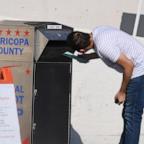Debt Creates Long-Term Burdens for Student Borrowers
A consumer protection bureau wants to regulate loan servicing companies.
March 15, 2013— -- The number of students who graduate from college saddled with significant debt is growing, and the process of repaying loans can be contentious for all involved.
The Consumer Financial Protection Bureau said on Thursday that it wants to regulate the companies hired by lenders to maintain records, collect payments and report to creditors and investors.
Students, who have no say over which company services their loans, complain that the companies treat them poorly, but the companies counter that they are dealing with an increasing number of borrowers who either cannot or will not repay their loans.
The bureau wants to supervise companies that handle more than a million student loan accounts. It is also concerned that private loan repayment options are limited and often come with high interest rates.
According to the bureau, there are more than 38 million student-loan borrowers, who combined owe more than a trillion dollars in outstanding debt. In the 2007-2008 academic year, nearly 40 percent of undergraduates and 43 percent of graduate students took out loans. As of 2011, there were more than $8 billion in defaulted private student loan balances. While federal loans often come with income-based repayment options, private loans are typically less flexible.
Reuters reports that, according to the Federal Reserve Bank of New York, 6.7 million borrowers were at least 90 days delinquent on their repayments.
The situation isn't just a problem for lenders who want their money back. According to the bureau, distress among borrowers could also negatively impact the economy. Debt may limit consumption as people tighten their belts and devote more money to loan repayment, which could affect everything from homeownership to car sales.
Meanwhile, college costs continue to rise. States and local governments have reduced the amount of funding they give to colleges, and schools have turned to students to make up the lost funds.
According to a 2012 report from the Center for American Progress (CAP), minority students are particularly likely to graduate with debt.
"African American and Latino students are especially saddled with student debt, with 81 percent of African American students and 67 percent of Latino students who earned bachelor's degrees leaving school with debt. This compares to 64 percent of white students who graduate with debt," reads a 2012 report.
Latinos are also more likely than whites or blacks to be unemployed when they graduate, which makes paying back loans especially difficult.
The situation is even worse for students at for-profit colleges, which disproportionately attract minority students. For-profit colleges are mostly owned by publicly traded companies and private equity firms. Much of their funding comes from federal student loans, but federal regulations mandate that 10 percent of their revenue come from other sources. The colleges often target veterans because veterans' benefits count toward fulfilling that requirement




